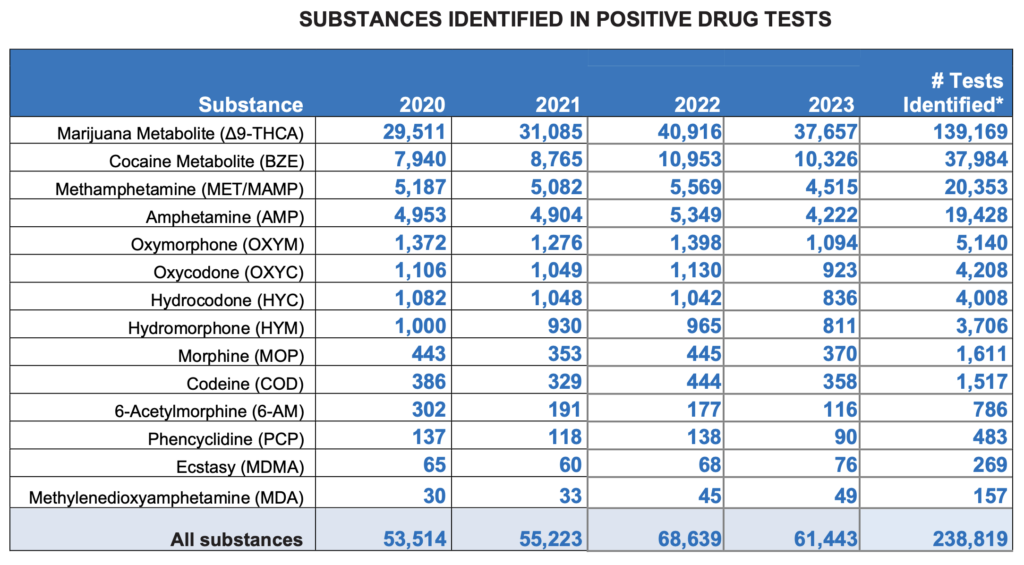Politics
Record Number Of Truck Drivers Refuse To Take Drug Tests As More States Legalize Marijuana

As more states legalize marijuana, a new federal report shows that the number of positive drug tests among commercial drivers fell last year compared to the year before, dropping from 57,597 in 2022 to 54,464 in 2023. At the same time, however, the number of drivers who refused to be screened at all also increased by 39 percent.
The record-high number of refusals comes as the transportation industry faces a nationwide shortage of drivers, which some trade groups have said has only been made worse by drug testing policies that risk flagging drivers even when they’re not impaired on the job.
The rise in refusals meant that even though there were fewer positive tests overall in 2023, the total number of recorded drug violations among truckers actually rose slightly—to 68,229 in 2023 compared to 67,775 a year earlier.
“The overall rise in drug violations in 2023, even though there are fewer positive tests, is attributed to a nearly 40% increase in reported drug test refusals—9,214 in 2022 versus 12,804 in 2023,” the Federal Motor Carrier Safety Administration (FMCSA), which produced the new report, told the trade publication Transport Topics.
“Drug test refusals include employer reported refusals like failing to show up for a random test, or leaving a test collection facility after a test has begun but before it’s complete,” added FMCSA, an arm of the U.S. Department of Transportation.
The data come from a year-end summary report of the agency’s Drug and Alcohol Clearinghouse, which includes reports from commercial driver’s license and commercial learner’s permit holders, employers, administrators, medical review officers and substance abuse professionals. In 2023, about 858,000 drivers were registered, a number that’s dropped consistently since 2020.
In terms of alcohol tests, 2023 saw a rise in positives compared to a year earlier—up about 15 percent, the report shows. Positive tests for alcohol have risen each year since 2020.

Drug and Alcohol Clearinghouse / Department of Transportation
Dan Murray, senior vice president for the American Transportation Research Institute, told Transport Topics there could be variety of possible explanations both for the dropping numbers of failed tests and the rising numbers of refusals.
“They say, ‘It’s not worth it to push my luck. If I use, I’m going to get tested. If I get tested, I’m going to lose my job. So it’s time to clean up my act,'” Murray said. Others, he added, “are proactively thinking, ‘Well, before I get caught, I’m outta here.'”
Among screenings for drugs, marijuana metabolites were the top positive result—followed by evidence of the use of cocaine, methamphetamine, amphetamine, various opioids and others. More than one substance can be recorded from a single positive test.
Positive tests for marijuana specifically fell from 40,916 in 2022 to 37,657 last year, the report found.

Drug and Alcohol Clearinghouse / Department of Transportation
In June of last year, a survey of licensed U.S. truck drivers found that 72.4 percent supported “loosening” cannabis laws and testing policies. Another 66.5 percent said that marijuana should be federally legalized.
Another question found that 65.4 percent of motor carriers believed current marijuana testing procedures should be replaced with methods that measure active impairment.
At the time, the report from the American Transportation Research Institute (ATRI) noted a 65,000-driver deficit in the country and said the fear of positives over marijuana metabolites—which can remain in a person’s blood far long after active impairment—may be keeping would-be drivers out of the industry.
“More than half of all positive trucking industry drug tests are for marijuana metabolite,” said the report. Federal prohibition “has been highlighted as a potential disincentive for drivers to stay in the industry, and it has even been argued that loosening the restrictions on marijuana use would make the industry more attractive and widen the potential labor pool.”
Current federal law mandates that commercial drivers abstain from cannabis, subjecting them to various forms of drug screening, from pre-employment to randomized testing.
ATRI, noting that cannabis metabolites can be detected via drug testing long after someone is no longer intoxicated, said that while “current marijuana testing is likely effective at removing drivers who may work while impaired, it also likely removes drivers who previously used the drug but would not operate a truck while impaired.”
A top Wells Fargo analyst said in 2022 that there’s one main reason for rising costs and worker shortages in the transportation sector: federal marijuana criminalization and resulting drug testing mandates that persist even as more states enact legalization.
Rep. Earl Blumenauer (D-OR) sent a letter to the head of DOT in 2022, emphasizing that the agency’s policies on drug testing truckers and other commercial drivers for marijuana are unnecessarily costing people their jobs and contributing to supply chain issues.
Last year’s ATRI report noted that research into the impact of cannabis use on driving and highway safety is currently mixed, complicating rulemaking to address the issue. A separate 2019 report from the Congressional Research Service (CRS) similarly found that evidence about cannabis’s ability to impair driving is inconclusive.
Also last year, DOT finalized a rule permitting another alternative option to screening urine samples: saliva-based testing. Depending on frequency of use, THC is generally detectable in saliva anywhere from one to 24 hours after use, according to the agency.
In 2022, meanwhile, DOT proposed guidance warning commercial drivers who use CBD products that they are doing so “at their own risk.”
A newsletter from DOT’s Federal Transit Administration (FTA) published that same year included two sections on cannabis issues: one that again reminded employees that they’re barred from using marijuana and another that similarly warned that CBD products remain unregulated and could contain THC levels that are detectable in a drug test.
Meanwhile the head of the American Trucking Association (ATA) told Congress a year ago that the state–federal marijuana policy conflict is creating a “litigious environment” for the trucking industry, contributing to the challenge of the labor shortage.
“Want to smoke weed at home? Smoke weed at home. If it’s legal, fine,” said ATA President Chris Spear. “Do not get behind the wheel of an 80,000-pound vehicle. We need to have strong standards, and we need to enforce the law.”
It’s Time To Rethink Termination Of Employees For Positive Marijuana Drug Tests (Op-Ed)















